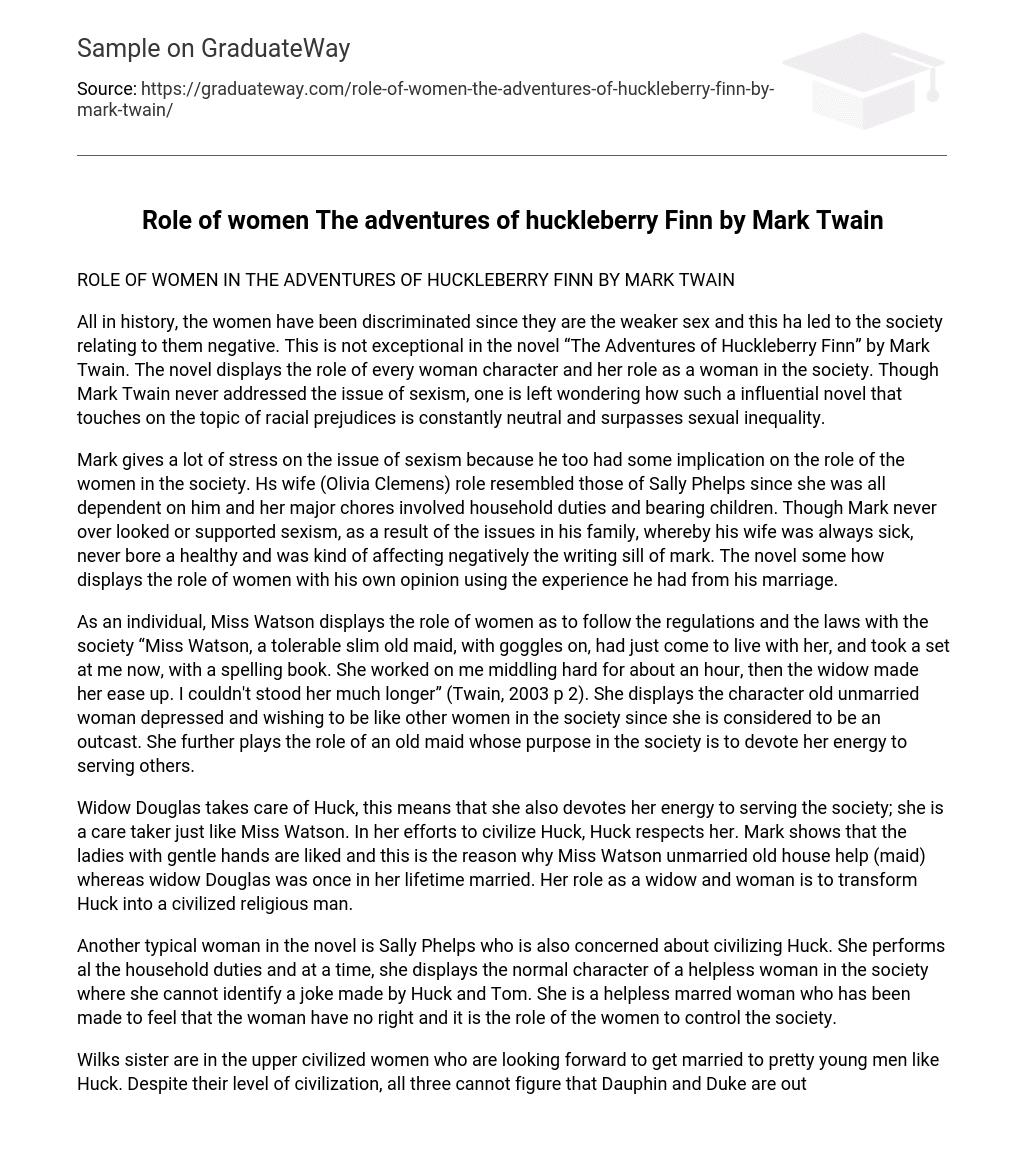All in history, the women have been discriminated since they are the weaker sex and this ha led to the society relating to them negative. This is not exceptional in the novel “The Adventures of Huckleberry Finn” by Mark Twain. The novel displays the role of every woman character and her role as a woman in the society. Though Mark Twain never addressed the issue of sexism, one is left wondering how such a influential novel that touches on the topic of racial prejudices is constantly neutral and surpasses sexual inequality.
Mark gives a lot of stress on the issue of sexism because he too had some implication on the role of the women in the society. Hs wife (Olivia Clemens) role resembled those of Sally Phelps since she was all dependent on him and her major chores involved household duties and bearing children. Though Mark never over looked or supported sexism, as a result of the issues in his family, whereby his wife was always sick, never bore a healthy and was kind of affecting negatively the writing sill of mark. The novel some how displays the role of women with his own opinion using the experience he had from his marriage.
As an individual, Miss Watson displays the role of women as to follow the regulations and the laws with the society “Miss Watson, a tolerable slim old maid, with goggles on, had just come to live with her, and took a set at me now, with a spelling book. She worked on me middling hard for about an hour, then the widow made her ease up. I couldn’t stood her much longer” (Twain, 2003 p 2). She displays the character old unmarried woman depressed and wishing to be like other women in the society since she is considered to be an outcast. She further plays the role of an old maid whose purpose in the society is to devote her energy to serving others.
Widow Douglas takes care of Huck, this means that she also devotes her energy to serving the society; she is a care taker just like Miss Watson. In her efforts to civilize Huck, Huck respects her. Mark shows that the ladies with gentle hands are liked and this is the reason why Miss Watson unmarried old house help (maid) whereas widow Douglas was once in her lifetime married. Her role as a widow and woman is to transform Huck into a civilized religious man.
Another typical woman in the novel is Sally Phelps who is also concerned about civilizing Huck. She performs al the household duties and at a time, she displays the normal character of a helpless woman in the society where she cannot identify a joke made by Huck and Tom. She is a helpless marred woman who has been made to feel that the woman have no right and it is the role of the women to control the society.
Wilks sister are in the upper civilized women who are looking forward to get married to pretty young men like Huck. Despite their level of civilization, all three cannot figure that Dauphin and Duke are out to take advantage and con them. This situation is used by mark to show that the women, even in a group cannot use their brains and therefore are there within the society to be used by the superior males. The group of three women are conned by their uncles off their father’s fortune. This shows that women are to be manipulated /tricked easily by the males within the society.
The women also play a crucial role in displaying the theme of hypocrisy. An example is Miss Watson who despite being a committed Christian owns slave which is against the Christian teachings.
Mark in this novel clearly displays the role of the women in the society during his time and though he did not support their sexism, he believed that women were some how to blame for their situation or condition in the society; this because either in a group or in their marital homes, they are totally dependent on men.
Through society’s views we see the women in the novel are nothing special. Typical appears quite frequently and maybe this is what Twain was going for all along; women are nothing special, you can only expect them to do so much, after all they do what you tell them.
Work cited
- Twain Mark, The Adventures of Huckleberry Finn, Robert G. O’Meally (Contributor)
- London, Published by Spark Educational Publishers, 2003





